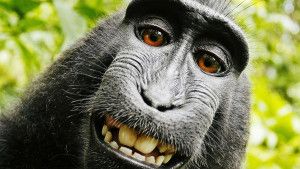It appears that the much-maligned "monkey selfie" case is destined for a quick exit. The U.S. District Court for the Northern District of California posted a brief order expressing the sentiment of the presiding judge as expressed at a hearing on a defendant's motion to dismiss. Specifically, the Hon. William H. Orrick made a tentative ruling that the photograph of a crested black macaque cannot be copyrighted on behalf of the animal itself.

(This is still not a copyrighted photo)
How did we get here? Earlier this year, People for the Ethical Treatment of Animals (PETA) filed suit in California over the so-called "Monkey selfie," PETA asserted than an animal named Naruto was the author and holder of the copyright. PETA made this argument notwithstanding the Third Edition of the Compendium of U.S. Copyright Office Practices' statement that "A photograph taken by a monkey" an example of a work that cannot be copyrighted.
One of the defendants, Blurb, Inc., moved to dismiss primarily on these grounds last fall. The fundamental argument of the motion was that an animal cannot have standing to sue under the Copyright Act for the basic reason that the Copyright Act does not say they can. In opposition, PETA argued for a broader interpretation of the Copyright Act. PETA argued that the text of the Copyright Act is focused on authorship and ownership, not the species of that author or owner. PETA frames the choice by Congress not to define "author" as the absence of a limitation on that definition to just human beings.
While a final Order has not yet been issued, the Order posted yesterday makes clear that Judge Orrick was having none of it:
The Court announces the tentative opinion, in line with the Ninth Circuit's opinion in Cetacean Community v Bush, that while Congress and the President can extend the protection of law to animals as well as humans, there is no indication that they did so in the Copyright Act. The Copyright Office's Compendium is consistent with the Court's understanding.
Ars Technica reported further about the hearing itself:
"I'm not the person to weigh into this," Orrick said from the bench in San Francisco federal court. "This is an issue for Congress and the president. If they think animals should have the right of copyright they're free, I think, under the Constitution, to do that."
This result is not a major surprise, though one expects that PETA's target all along was the Ninth Circuit, where it surely knew it would end up. I don't find the assertion of copyright on behalf of an animal as an author particularly interesting, there's simply no way to read the Copyright Act in a way that would permit that interpretation.
The lost opportunity to me is what I view as the overstatement and oversimplification in the Copyright Office Compendium. Even if "a photograph taken by a money" cannot be copyrighted by the monkey, why does that categorically rule out any copyright for a human author? For example, it is not terrible hard to conceive of a work in which cameras are intentionally left in a place where some natural force or animal will cause them to snap a photo. I could see an argument to copyright that work on behalf of the human who left the camera there as part of an intentional creative process. Slater's photo was unlikely to fall into such a category, it was by all accounts a pure accident in the course of a documentary photography effort.
These will remain questions for another day. Naruto will have thirty days to appeal when the judgment issues. He was reportedly not available for comment.
The content of this article is intended to provide a general guide to the subject matter. Specialist advice should be sought about your specific circumstances.

